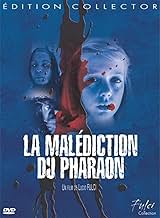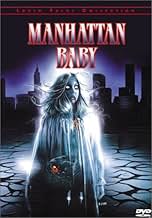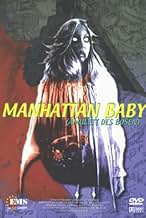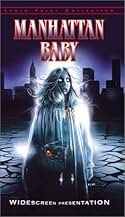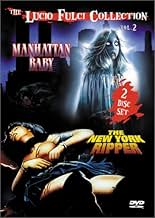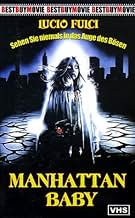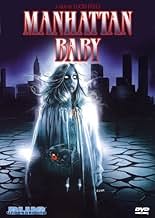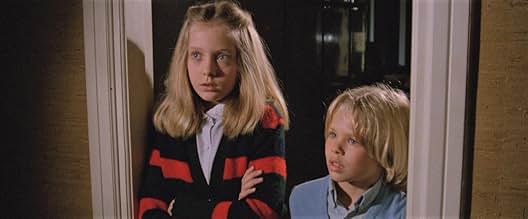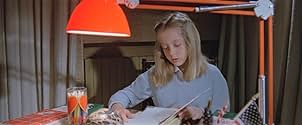CALIFICACIÓN DE IMDb
4.8/10
3.5 k
TU CALIFICACIÓN
Agrega una trama en tu idiomaAn archaeologist opens an Egyptian tomb and accidentally releases an evil spirit. His young daughter becomes possessed by the freed entity and, upon arrival back in New York, the gory murder... Leer todoAn archaeologist opens an Egyptian tomb and accidentally releases an evil spirit. His young daughter becomes possessed by the freed entity and, upon arrival back in New York, the gory murders begin.An archaeologist opens an Egyptian tomb and accidentally releases an evil spirit. His young daughter becomes possessed by the freed entity and, upon arrival back in New York, the gory murders begin.
- Dirección
- Guionistas
- Elenco
Laura Lenzi
- Emily Hacker
- (as Martha Taylor)
Cosimo Cinieri
- Adrian Mercato
- (as Laurence Welles)
Enzo Marino Bellanich
- Wiler
- (as Vincenzo Bellanich)
Tonino Pulci
- Orderly
- (as Antonie Pulci)
Martin Sorrentino
- Caretaker
- (sin créditos)
Opiniones destacadas
If you have some acquaintance with other Fulci films, especially the ones from the so-called "Gates of Hell Trilogy", then you know that eyes are, to say at least, a repetitive motive, from the gore set pieces, like the nail killing in "L'aldilà" (eng: The Beyond), to the many eye close-up shots in the dialogue scenes of "Manhattan Baby". Against this general background, this movie can be regarded as a key film. Here, Fulci is somewhat presenting in a very explicit way the coding of the eyes (and The Eye) in his own cinematic style.
While travelling in Egypt with his mother and his archeologist father, a girl receives an ancient medallion representing an eye (very similar to the Eye of Horus) from a mysterious white-eyed woman that then disappears in the air (literally). Almost at the same time, her father is blinded by the same eye-shaped symbol, only this one is carved in the wall of an underground tomb inside a forbidden pyramid. The family goes back to New York and there the medallion starts to exert its influence, taking control over the girl, triggering supernatural events in the family's apartment and opening a portal to another space-time dimension.
The medallion is the divine Eye (its link with divinity is explicitly mentioned in the film), an access to the world of The Beyond. The blind woman that gives the medallion to the girl has white-veiled eyes, just like the blind young woman with the dog and the main characters at the end of "L'aldilà". We know, from this last movie, what these white eyes can mean in the Fulci code: vision-knowledge of the other side, and the ability to move between that place and this human dimension. But we also have the fragile human eyes (e.g. the eyes of the father) and mundane blindness: the inability to see and to understand.
On a more stylistic level, we have all the already mentioned eye close-up shots during dialogues. The tension, the real intensity is always happening at the level of looks in Fulci and almost never at the level of words. Language is often banal and stereotyped in this film, as in many others by this director. Characters in the worldly sphere also tend to be very one-dimensional: the father is the scientist, the man of reason, the babysitter is the beautiful and lively girl, the parapsychologist is the somewhat sinister and dark man surrounded by antiques and stuffed birds, etc. And then there's that simple and repetitive sax score during many of the urban sequences, an almost vulgar soundtrack that is in violent contrast with the fantastic chaos raised by the medallion. It is Fulci's violent cut between the worlds, the one that seem to disconcert many viewers and that is also violently translated to cinematic form by this director. The cut between an abysmally stereotyped everyday human world, the world of frightened and fragile human eyes and the powerful world of The Eye that lies Beyond.
While travelling in Egypt with his mother and his archeologist father, a girl receives an ancient medallion representing an eye (very similar to the Eye of Horus) from a mysterious white-eyed woman that then disappears in the air (literally). Almost at the same time, her father is blinded by the same eye-shaped symbol, only this one is carved in the wall of an underground tomb inside a forbidden pyramid. The family goes back to New York and there the medallion starts to exert its influence, taking control over the girl, triggering supernatural events in the family's apartment and opening a portal to another space-time dimension.
The medallion is the divine Eye (its link with divinity is explicitly mentioned in the film), an access to the world of The Beyond. The blind woman that gives the medallion to the girl has white-veiled eyes, just like the blind young woman with the dog and the main characters at the end of "L'aldilà". We know, from this last movie, what these white eyes can mean in the Fulci code: vision-knowledge of the other side, and the ability to move between that place and this human dimension. But we also have the fragile human eyes (e.g. the eyes of the father) and mundane blindness: the inability to see and to understand.
On a more stylistic level, we have all the already mentioned eye close-up shots during dialogues. The tension, the real intensity is always happening at the level of looks in Fulci and almost never at the level of words. Language is often banal and stereotyped in this film, as in many others by this director. Characters in the worldly sphere also tend to be very one-dimensional: the father is the scientist, the man of reason, the babysitter is the beautiful and lively girl, the parapsychologist is the somewhat sinister and dark man surrounded by antiques and stuffed birds, etc. And then there's that simple and repetitive sax score during many of the urban sequences, an almost vulgar soundtrack that is in violent contrast with the fantastic chaos raised by the medallion. It is Fulci's violent cut between the worlds, the one that seem to disconcert many viewers and that is also violently translated to cinematic form by this director. The cut between an abysmally stereotyped everyday human world, the world of frightened and fragile human eyes and the powerful world of The Eye that lies Beyond.
Lucio Fulci dips his toes into the supernatural horror genre with fair results, in this mostly NYC set genre flick. Christopher Connelly ('Peyton Place', "Benji", "1990: The Bronx Warriors") stars as George Hacker, an archaeologist examining some ruins in Egypt. Gee, do you think he'll come to regret this decision? As it so happens, an ancient evil spirit is now free, and it comes to roost inside his adorable daughter Susie (Brigitta Boccoli). George must unravel the mystery of a strange gem and decipher the message left on a photo given to his wife Emily (Laura Lenzi).
It's not that surprising to learn that Fulci was left with a budget far less than what he had been promised. In the end, the film is certainly watchable enough, but has very little in it that's all that memorable. Fulci delivers gore only in small bits and pieces until the gloriously sadistic ending. Until then, we see some mildly amusing paranormal occurrences, which involve such people as the couples' au pair Jamie Lee (Cinzia de Ponti) and Emily's wacky co- worker Luke (Carlo De Mejo). The opening sequence in Egypt is pretty good and atmospheric. One of the most enjoyable components is the typically eclectic music score by Fabio Frizzi. The makeup effects are quite effective.
The performances don't knock your socks off, but they get the job done. Connelly, whose character is stricken blind for a while, rarely changes his facial expression all that much. Lovely ladies de Ponti and Lenzi are quite easy to watch. Boccoli does a decent job for a child actress. Giovanni Frezza (Bob!) co-stars as her smart mouthed brother, and Fulci has his customary cameo as a doctor in the final portion of the picture. Cosimo Cinieri has a good look as a stranger who lends some valuable assistance.
This is good fun for Fulci fans, but overall isn't anything really special.
Six out of 10.
It's not that surprising to learn that Fulci was left with a budget far less than what he had been promised. In the end, the film is certainly watchable enough, but has very little in it that's all that memorable. Fulci delivers gore only in small bits and pieces until the gloriously sadistic ending. Until then, we see some mildly amusing paranormal occurrences, which involve such people as the couples' au pair Jamie Lee (Cinzia de Ponti) and Emily's wacky co- worker Luke (Carlo De Mejo). The opening sequence in Egypt is pretty good and atmospheric. One of the most enjoyable components is the typically eclectic music score by Fabio Frizzi. The makeup effects are quite effective.
The performances don't knock your socks off, but they get the job done. Connelly, whose character is stricken blind for a while, rarely changes his facial expression all that much. Lovely ladies de Ponti and Lenzi are quite easy to watch. Boccoli does a decent job for a child actress. Giovanni Frezza (Bob!) co-stars as her smart mouthed brother, and Fulci has his customary cameo as a doctor in the final portion of the picture. Cosimo Cinieri has a good look as a stranger who lends some valuable assistance.
This is good fun for Fulci fans, but overall isn't anything really special.
Six out of 10.
"Manhattan baby" is another supernatural horror movie shot during the Maestro's most prolific period.
The movie being accorded only a fraction of the planned budget, it never had the chance to become what its makers probably intended.
Still it contains some beautiful surrealistic and atmospheric scenes which are worth watching. The opening scene in Egypt is just marvelous and keeps up with Fulci's best work. After the Hacker family returns to New York, the little daughter experiences contact with evil through the amulet she got in Egypt. This allows Fulci to devise the movie like "The Gates of Hell" or "The Beyond", meaning as a succession of loosely related scenes depicting strange occurences. Some of those scenes are interesting, such as the snake attack and the blood stains on the wall, announcing the return of "poor Jamie Lee". Others are ridiculous, like Adrian Mercato winding in spasms on the ground. The final attack by stuffed birds is spoiled by the visibility of the wires (in good tradition of other phony attacks by animals).
Although the overall result of "Manhattan Baby" is not as convincing and terrifying as Fulci's previous flics, it still belongs to his strong period in horror film making and is therefore recommended to everyone who likes Fulci's style not just for the sake of gore (as "Manhattan Baby" contains only few).
The movie being accorded only a fraction of the planned budget, it never had the chance to become what its makers probably intended.
Still it contains some beautiful surrealistic and atmospheric scenes which are worth watching. The opening scene in Egypt is just marvelous and keeps up with Fulci's best work. After the Hacker family returns to New York, the little daughter experiences contact with evil through the amulet she got in Egypt. This allows Fulci to devise the movie like "The Gates of Hell" or "The Beyond", meaning as a succession of loosely related scenes depicting strange occurences. Some of those scenes are interesting, such as the snake attack and the blood stains on the wall, announcing the return of "poor Jamie Lee". Others are ridiculous, like Adrian Mercato winding in spasms on the ground. The final attack by stuffed birds is spoiled by the visibility of the wires (in good tradition of other phony attacks by animals).
Although the overall result of "Manhattan Baby" is not as convincing and terrifying as Fulci's previous flics, it still belongs to his strong period in horror film making and is therefore recommended to everyone who likes Fulci's style not just for the sake of gore (as "Manhattan Baby" contains only few).
"Manhattan Baby" sure is one controversial Fulci flick. I have friends who love the man and hate this movie. I also have friends who don't know the man at all and love this movie.
The plot is a bit silly. A girl is given a trinket on vacation in Egypt and it turns out to contain horrific powers of destruction. I told you it was silly.
The special effects are very 1982. But wait; this movie was made in 1982. I'd recommend this to someone who has never seen a Fulci film and is not expecting to see "Zombie" or "The Beyond" again. This movie offers something different and something that I, a true Fulci admirer, appreciate and can watch over and over.
Yes, I like "Manhattan Baby." While it's not like the aforementioned Fulci greats, it remains entertaining and it does deliver some good scares. And decent gore.
7 out of 10, kids.
The plot is a bit silly. A girl is given a trinket on vacation in Egypt and it turns out to contain horrific powers of destruction. I told you it was silly.
The special effects are very 1982. But wait; this movie was made in 1982. I'd recommend this to someone who has never seen a Fulci film and is not expecting to see "Zombie" or "The Beyond" again. This movie offers something different and something that I, a true Fulci admirer, appreciate and can watch over and over.
Yes, I like "Manhattan Baby." While it's not like the aforementioned Fulci greats, it remains entertaining and it does deliver some good scares. And decent gore.
7 out of 10, kids.
We selected "Manhattan Baby" from the movie library last night, and I realized that it was to be probably the 7th time I have watched this rather uncelebrated Fulci offering in the past 5 years. Yes, this movie is a bit formulaic, and yes, it does move a bit slow in parts. But there is something undeniably menacing in this movie, an atmosphere of claustrophobia, the tightness of the endless close-ups of people's faces, that I enjoy and (obviously) come back to again and again. No, this is not a gory movie, which no doubt comes as a surprise (disappointment?) to fans of Fulci's other (mostly excellent) films. Even the death scenes, of which there are only 3 or 4, have minimal blood compared to something like "The Beyond", not that I would recommend this as hearty family fare by any means. But if you enjoy the uniquely "European" dreamlike atmosphere created by a combination of cheesy effects, plot holes, wooden acting, bad dubbing, and inexplicable motivations of characters, this may be one you revisit again, and again and again... you get the idea.
¿Sabías que…?
- TriviaThe name of the character Adrian Marcato is borrowed from El bebé de Rosemary (1968). The title "Manhattan Baby" was also derived from the title of the Polanski film, despite Director Lucio Fulci hating the title, and Screenwriter Dardano Sacchetti preferring his title "The Evil Eye". That version of the title was reworked in the US to " Eye of the Evil Dead", deriving from Sam Raimi's classic "The Evil Dead". Raimi was at first irritated, but learned Fulci's background with having no leverage over distribution decisions, and more or less felt bad for him and took no legal action.
- ErroresReflected in the archaeologist's big sunglasses when we see him in his office in New York near the beginning of the film.
- Versiones alternativasThe Anchor Bay release under the original title "Manhattan Baby" is the complete, uncut version, containing all the gore and violence.
- ConexionesFeatured in Beyond the Living Dead (2001)
Selecciones populares
Inicia sesión para calificar y agrega a la lista de videos para obtener recomendaciones personalizadas
- How long is Manhattan Baby?Con tecnología de Alexa
Detalles
Taquilla
- Presupuesto
- USD 300,000 (estimado)
- Tiempo de ejecución1 hora 29 minutos
- Mezcla de sonido
- Relación de aspecto
- 2.35 : 1
Contribuir a esta página
Sugiere una edición o agrega el contenido que falta

Principales brechas de datos
By what name was Manhattan Baby (1982) officially released in India in English?
Responda

